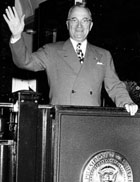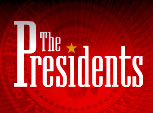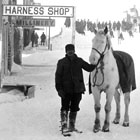Truman Presidential Museum and Library

The presidency of Harry S. Truman is addressed through these hundreds of government documents, oral histories, photographs, and political cartoons. Materials cover topics including the Berlin airlift, the decision to drop the atomic bomb, desegregation of the Armed Forces, the election campaign of 1948, the Korean War, the Marshall Plan, NATO, the Truman Doctrine, Truman's Farewell Address, the recognition of the State of Israel, the United Nations, and the incarceration of Japanese Americans during World War II. Transcripts are available for approximately 120 oral histories conducted with members of Truman's administration and officials from other countries on the Korean War. The website also offers the full text of Truman's diary from 1947; more than 50 audio files with extracts of speeches, press conferences, and interviews; and more than 31,000 biographical photographs.






